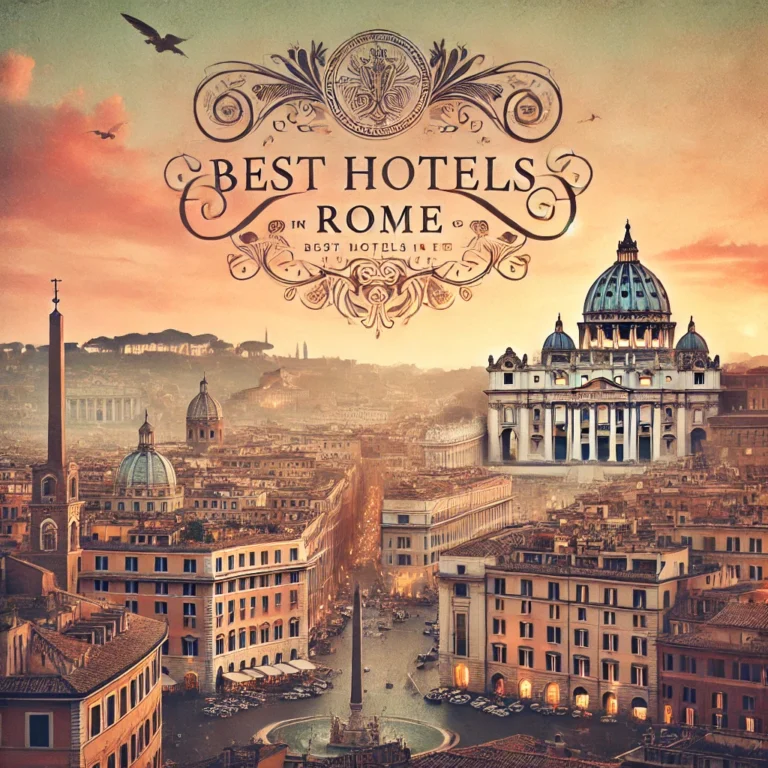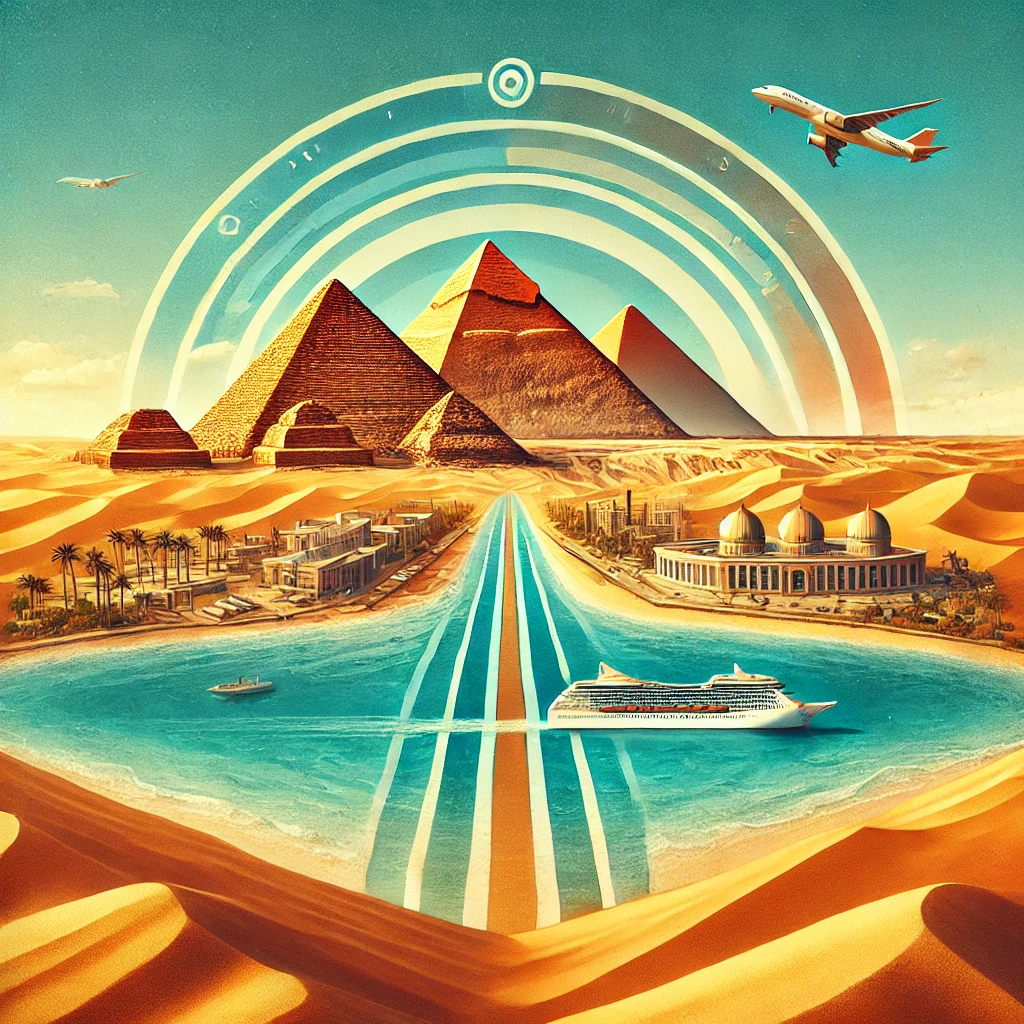
Egypt, a land of ancient wonders and stunning coastlines, offers something unique for every traveler.
Whether you’re mesmerized by the historic pyramids or yearning for a beach escape along the Red Sea, planning your trip around the best time to visit Egypt is key.
In this guide, we’ll explore the ideal seasons for your adventure based on your interests—whether you’re a history buff, beach lover, or thrill-seeking adventurer!
Winter (December to February) – Ideal for Sightseeing
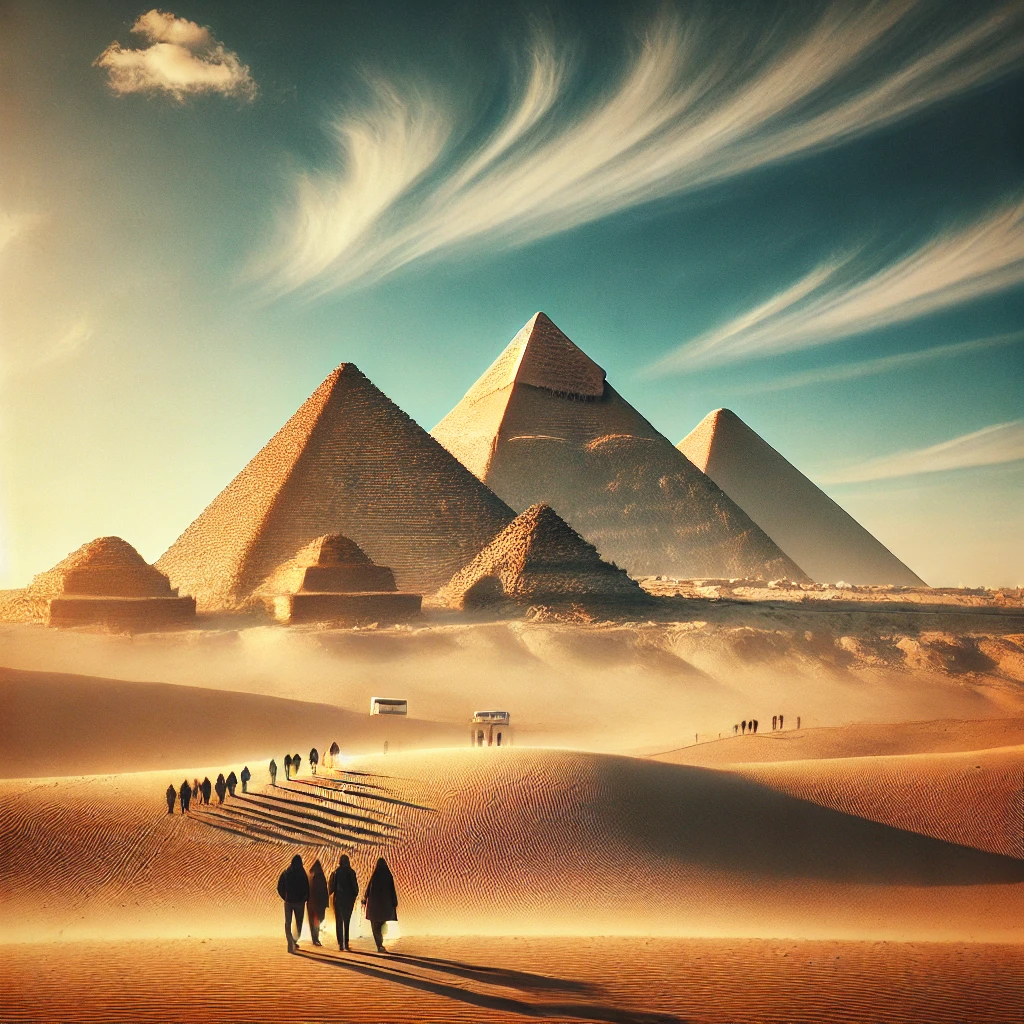
Why Winter Is the Best Time for Cultural Exploration:
Egypt’s winter months offer a comfortable escape from the extreme heat, making this season perfect for exploring the country’s ancient wonders.
Whether you’re fascinated by the Pyramids of Giza or the sprawling temples of Luxor, the cooler temperatures make sightseeing far more enjoyable.
Winters in Egypt are mild, with daytime highs ranging from 55°F to 75°F (13°C to 24°C), creating ideal conditions for walking tours, historical explorations, and desert treks.
Key Attractions:
- Pyramids of Giza: No trip to Egypt is complete without visiting the iconic Pyramids of Giza. In winter, the cooler temperatures and fewer crowds make it easier to spend hours marveling at these wonders.
- Valley of the Kings: Luxor’s Valley of the Kings, home to the tombs of ancient pharaohs, is far more comfortable to explore during winter. You can stroll through these sites without worrying about heat exhaustion.
- Abu Simbel Temples: Located in southern Egypt, Abu Simbel is one of Egypt’s most impressive temple complexes, built by Ramses II. Winter’s mild weather makes this remote destination more accessible and enjoyable.
Who Should Visit in Winter:
- History and Culture Enthusiasts: If your goal is to explore Egypt’s rich history, this is the perfect season for you. You’ll avoid the intense summer heat and have plenty of time to absorb the country’s ancient treasures.
- Photographers: Winter’s softer light and clear skies create excellent conditions for capturing Egypt’s architectural marvels.
Pros & Cons of Visiting in Winter:
- Pros:
- Comfortable temperatures for sightseeing.
- Fewer crowds compared to spring and summer.
- Beautiful, clear skies for photography.
- Cons:
- Popular tourist spots may still be busy, especially during the holiday season.
- Prices for accommodation and tours can be higher.
Packing Tips for Winter:
- Layered clothing for fluctuating temperatures between day and night.
- A light jacket or sweater for cool mornings and evenings.
- Comfortable shoes for walking on uneven ground at archaeological sites.
Spring (March to May) – Perfect for Desert Adventures

Why Spring is Best for Adventurers:
Spring in Egypt offers warm, pleasant temperatures (60°F to 85°F/16°C to 29°C), perfect for outdoor and adventure activities.
This season is ideal for travelers interested in exploring Egypt’s diverse landscapes—from desert dunes to Nile River cruises.
With blooming flowers and green oases, spring adds a touch of color to Egypt’s otherwise golden, arid landscapes.
Key Attractions:
- Siwa Oasis and Desert Safaris: The Siwa Oasis, located in Egypt’s Western Desert, is a remote, beautiful spot full of palm trees, salt lakes, and ancient ruins. Desert safaris in the surrounding area offer a chance to experience Egypt’s vast and awe-inspiring deserts.
- Hot Air Balloon Rides in Luxor: Spring is one of the best times to take a hot air balloon ride over Luxor. You’ll drift over the ancient temples and Nile River as the sun rises over Egypt’s stunning landscape.
- Nile River Cruises: Mild spring weather makes it a great time for a relaxing cruise along the Nile River, where you can experience Egypt’s stunning temples and lush riverbanks from the water.
Who Should Visit in Spring:
- Adventure Travelers: Whether it’s exploring Egypt’s remote deserts or floating over Luxor in a hot air balloon, spring offers the perfect mix of warm weather and exciting outdoor activities.
- Nature Lovers: Springtime brings blooming flowers and a more vibrant landscape, especially in Egypt’s oases and along the Nile River.
Pros & Cons of Visiting in Spring:
- Pros:
- Mild temperatures are perfect for both sightseeing and adventure activities.
- Spring blooms in oases like Siwa provide beautiful landscapes.
- Desert nights are comfortably cool.
- Cons:
- Prices can still be high during peak spring months.
- Some areas, like Cairo, might start getting warmer by May.
Packing Tips for Spring:
- Light, breathable clothing for warm days.
- A hat and sunglasses to protect against the sun.
- A light jacket for cooler evenings, especially in the desert.
Summer (June to August) – Time for a Beach Escape
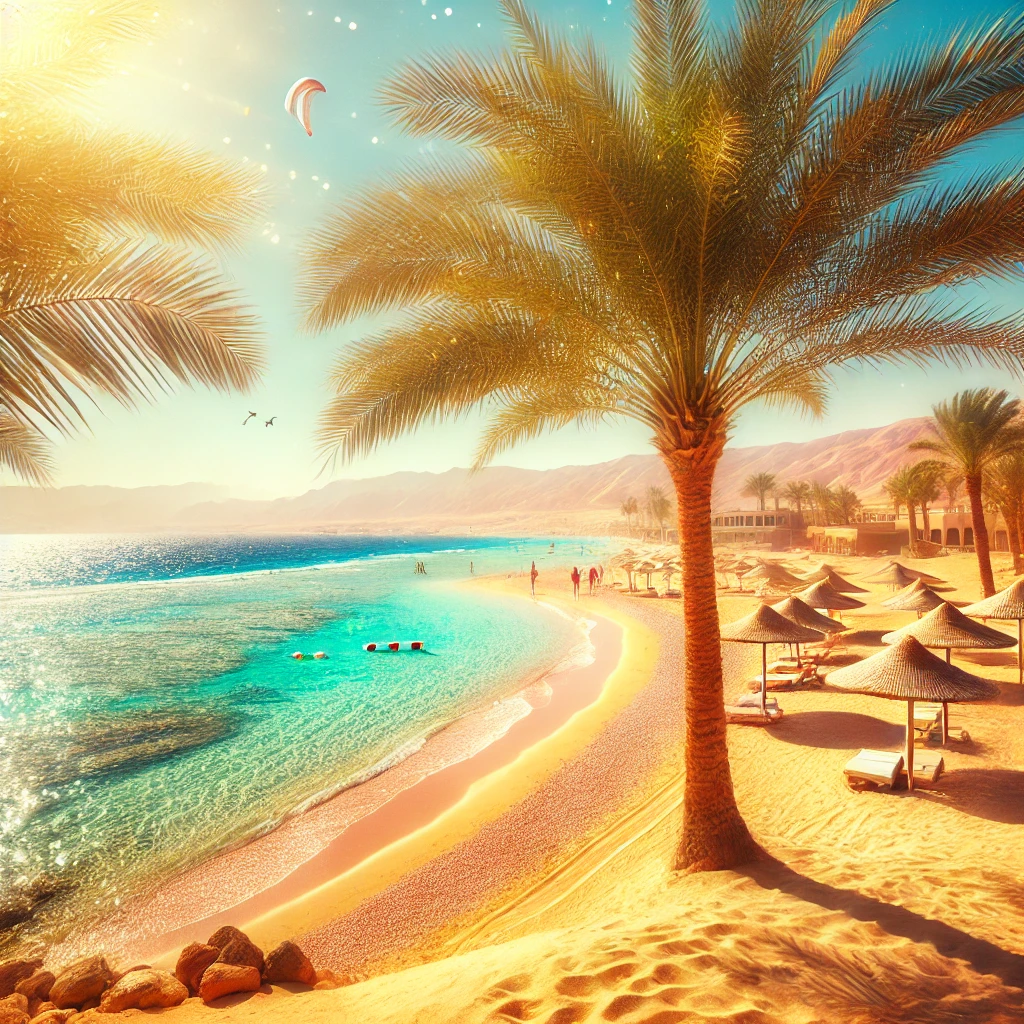
Why Summer is Perfect for Coastal Relaxation:
While summer temperatures can soar above 100°F (38°C) in Egypt’s cities and deserts, the coastal regions like the Red Sea, Hurghada, and Sharm El-Sheikh offer cooler breezes and refreshing waters.
Egypt’s beach destinations are world-renowned for their crystal-clear waters, vibrant coral reefs, and excellent opportunities for diving, snorkeling, and other water sports.
Key Attractions:
- Sharm El-Sheikh’s Beaches: Sharm El-Sheikh is famous for its luxurious beach resorts, world-class diving spots, and laid-back atmosphere. It’s the perfect destination for those looking to unwind and enjoy Egypt’s stunning coastline.
- Diving in the Red Sea: The Red Sea is one of the world’s premier diving destinations, offering vibrant coral reefs, shipwrecks, and abundant marine life. Dive spots like the Blue Hole in Dahab are perfect for both beginner and experienced divers.
- Kitesurfing in Hurghada: Hurghada, a popular resort town, is known for its kitesurfing spots, which offer ideal wind conditions during the summer months.
Who Should Visit in Summer:
- Beach and Water Sports Enthusiasts: If you’re more interested in lounging on the beach or exploring Egypt’s underwater treasures, summer is the best time for a visit.
- Budget Travelers: With inland temperatures rising, hotels and accommodations in cities like Cairo and Luxor are often much cheaper during summer. Beach resorts may also offer discounted rates, making summer a budget-friendly option.
Pros & Cons of Visiting in Summer:
- Pros:
- Ideal weather for beach and water activities.
- Fewer crowds at major historical sites.
- Significant discounts on accommodation in cities and some coastal areas.
- Cons:
- Extreme heat in inland regions like Cairo and Luxor.
- Some tourists may find sightseeing uncomfortable in high temperatures.
Packing Tips for Summer:
- Swimwear and beach essentials.
- Snorkeling or diving equipment if you prefer using your own.
- A wide-brimmed hat, sunglasses, and strong sunscreen for protection from the intense sun.
- Light, breathable clothing for hot weather.
Autumn (September to November) – A Perfect Mix for All Travelers

Why Autumn is Ideal for a Balanced Experience:
Autumn brings milder temperatures, making it one of the most versatile times to visit Egypt.
From September to November, the weather is warm enough for beach activities and comfortable enough for sightseeing.
The high tourist season winds down after summer, so you can explore Egypt’s historical and natural wonders without facing the summer crowds.
Key Attractions:
- The Pyramids of Giza: Autumn is a fantastic time to visit Egypt’s most famous site. The summer heat is gone, and the pyramids are less crowded, allowing you to enjoy your visit at a relaxed pace.
- Dahab’s Blue Hole: Known for its world-class diving, Dahab is a must-visit destination in autumn. The waters are still warm, and the conditions for diving and snorkeling are ideal.
- Cairo’s Souks: Autumn is perfect for exploring Cairo’s bustling markets, like the Khan El Khalili Bazaar, where you can shop for traditional crafts, spices, and souvenirs.
Who Should Visit in Autumn:
- Travelers Seeking a Mix of Activities: If you want to experience both Egypt’s historical wonders and its natural beauty, autumn offers the perfect balance. You can visit temples in the morning and relax on the beach in the afternoon.
- Cultural Explorers: Autumn is also a great time for immersing yourself in Egypt’s culture, as the cooler temperatures make it easier to explore cities like Cairo and Alexandria.
Pros & Cons of Visiting in Autumn:
- Pros:
- Ideal weather for both sightseeing and beach activities.
- Fewer crowds at major attractions compared to peak summer and winter seasons.
- Lower prices on accommodations as the high season ends.
- Cons:
- Some areas, like Alexandria, may experience occasional rain showers.
- Crowds may start picking up again in late November as the winter season approaches.
Packing Tips for Autumn:
- Light layers for the day and warmer clothing for cool evenings.
- Comfortable shoes for walking through historical sites and markets.
- Beachwear if you plan to visit Egypt’s coastal regions.
Egypt truly has something to offer year-round, whether you’re drawn to its timeless monuments, serene beaches, or thrilling desert adventures.
Timing your visit around the best season ensures that you experience Egypt in the way that suits your travel preferences best.
Whether you’re marveling at the pyramids in the cool winter breeze or diving into the Red Sea’s warm waters in summer, Egypt is ready to take your breath away.
Book your Egypt vacation now and find the perfect season for your adventure!
Insider Tips for Every Season
- Avoiding Crowds: Visit popular sites like the Pyramids early in the morning or late in the afternoon to avoid peak crowds.
- Best Time for Deals: For budget travelers, the summer heat means lower prices on flights and accommodations, especially in Cairo and Luxor.
- Cultural Considerations: Egypt’s holy month of Ramadan may affect restaurant hours and services, so plan accordingly. This typically falls between March and May.
Shopping and Equipment List
Here’s a handy list of must-haves to prepare you for your Egyptian adventure:
- Sun Protection Kit: Sunscreen, sunglasses, and a wide-brimmed hat.
- Comfortable Footwear: For both desert hikes and city explorations.
- Travel Adapter: Egypt uses a 220V power supply, so make sure you bring the right plugs.
- Reusable Water Bottle: Stay hydrated, especially during hot months.
- Scarf or Shawl: Handy for sun protection or visiting religious sites.
Where to Stay in Egypt
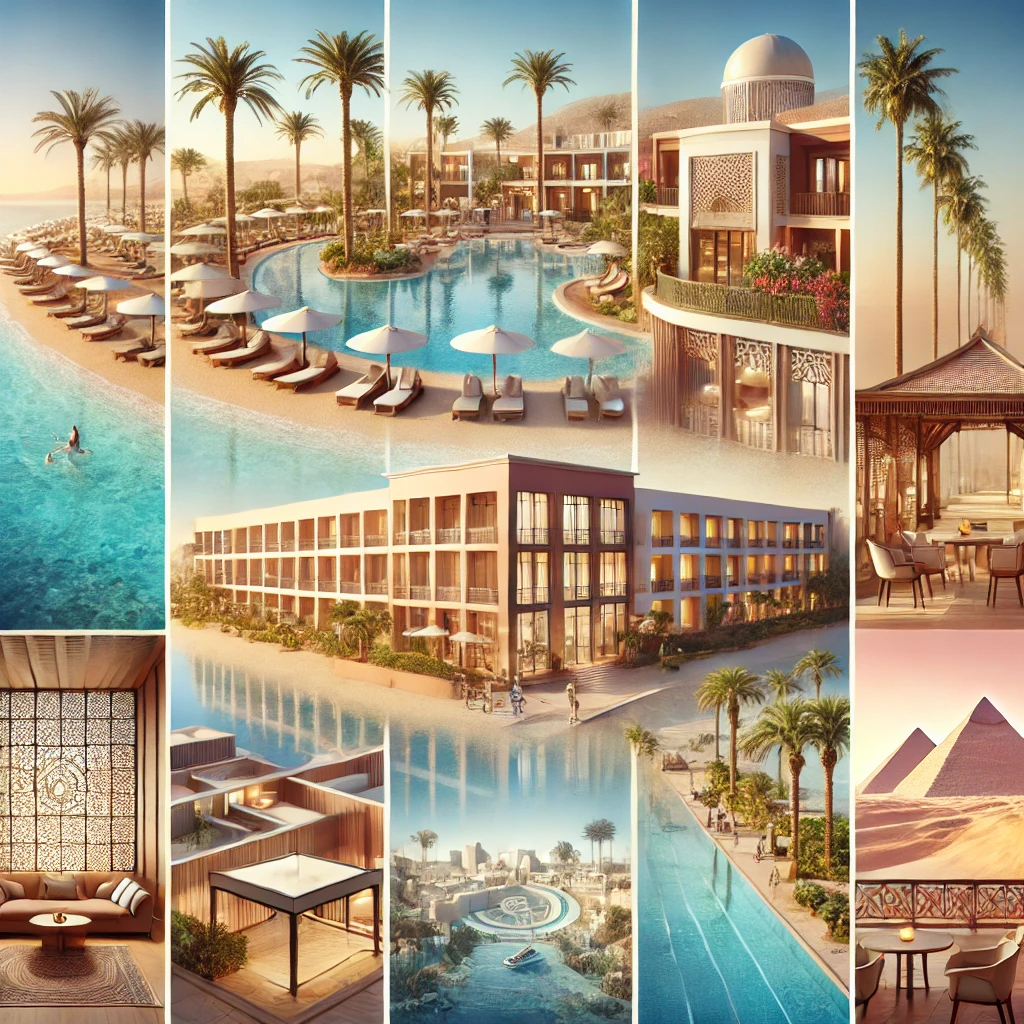
Whether you’re seeking luxury by the Red Sea, a comfortable base near the pyramids, or a unique desert retreat, Egypt offers a wide range of accommodations to suit every traveler’s style and budget. Here are some top picks for where to stay, depending on your travel plans:
1. For History Lovers: Cairo
Marriott Mena House, Cairo
Located just steps away from the Pyramids of Giza, this luxury hotel offers breathtaking views of one of the Seven Wonders of the World. Its historic charm and modern amenities make it perfect for travelers who want to immerse themselves in Egypt’s ancient culture.
Steigenberger Hotel El Tahrir, Cairo
This centrally located hotel is ideal for travelers who want to explore the Egyptian Museum, Tahrir Square, and other historical sites in the heart of Cairo.
2. For Beach Enthusiasts: Sharm El-Sheikh and Hurghada
Four Seasons Resort Sharm El-Sheikh
For those seeking a luxurious beach escape, the Four Seasons offers private beaches, incredible snorkeling spots, and first-class service. It’s the perfect getaway for relaxation and adventure on the Red Sea.
Jaz Aquamarine Resort, Hurghada
Located on the shores of the Red Sea, this all-inclusive resort is ideal for water sports lovers and families. With stunning beach access, multiple pools, and diving excursions, it’s a top pick for coastal relaxation.
3. For Desert Adventurers: Siwa Oasis
Adrere Amellal, Siwa Oasis
A one-of-a-kind eco-lodge, this desert hideaway offers a truly unique experience, surrounded by palm trees and salt lakes. If you’re seeking peace, quiet, and an off-the-grid adventure, this is the place to be.
Taziry Ecolodge, Siwa Oasis
Another beautiful eco-lodge in Siwa, this accommodation offers an authentic experience with traditional architecture and breathtaking desert views. Ideal for those who want to escape modernity and reconnect with nature.
4. For City Explorers: Alexandria
Overlooking the Mediterranean Sea, this hotel is perfect for travelers looking to explore the rich history of Alexandria, from its famous library to the Qaitbay Citadel.
Hilton Alexandria Corniche
Offering luxurious rooms with sea views, this hotel is centrally located near Alexandria’s top attractions, making it ideal for city explorers.
Accommodations for Every Traveler
No matter what type of traveler you are, Egypt’s diverse range of accommodations ensures you’ll find the perfect place to stay—whether you’re exploring the ancient pyramids, relaxing on the Red Sea, or seeking a desert escape.
Safety Tips for Traveling in Egypt
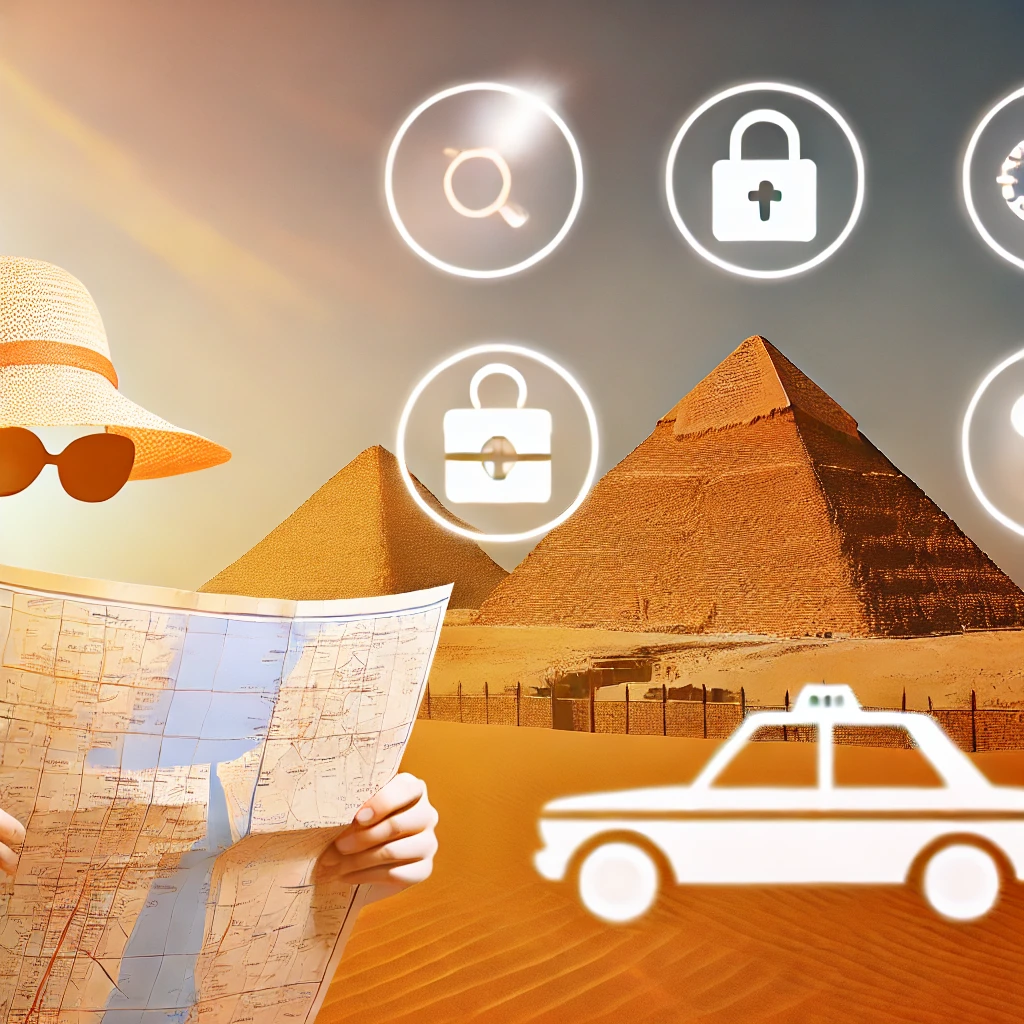
While Egypt is a popular and generally safe destination for travelers, it’s important to stay informed and take precautions to ensure a smooth and enjoyable experience.
Whether you’re exploring the bustling streets of Cairo, trekking through the desert, or relaxing on the Red Sea, these safety tips will help you stay safe and stress-free.
1. Stay Aware of Your Surroundings
Like any major tourist destination, it’s important to stay vigilant, especially in crowded areas such as markets, popular tourist attractions, and busy city streets.
Keep an eye on your belongings and be cautious of pickpockets in crowded spots like Khan El Khalili Bazaar in Cairo or near the Pyramids of Giza.
2. Use Reputable Transportation
When traveling between cities or to tourist attractions, always use reputable transportation services.
Taxis, Uber, and Careem (a local ride-hailing service) are generally safe options in major cities like Cairo and Alexandria.
For longer trips, opt for licensed tour buses or private transfers.
3. Dress Modestly
Egypt is a conservative country, and it’s respectful to dress modestly, especially when visiting religious sites, markets, or smaller towns.
Women should cover their shoulders and avoid wearing revealing clothing, while men should avoid sleeveless shirts in religious areas.
At beach resorts, swimwear is acceptable, but when leaving the resort, it’s a good idea to cover up.
4. Stay Hydrated and Protected from the Sun
Egypt’s climate can be extremely hot, especially in the summer months.
Always carry water with you to stay hydrated, and wear sunscreen, sunglasses, and a wide-brimmed hat to protect yourself from the sun.
Avoid being out in direct sunlight during the hottest part of the day (midday to early afternoon).
5. Beware of Scams
Tourist areas can sometimes attract scams, including people offering overpriced tours or selling fake goods.
Always book tours and excursions through reputable agencies or your hotel.
When shopping in markets, be prepared to haggle, but stay firm and polite.
6. Keep Copies of Important Documents
Keep photocopies of your passport, visa, and other important travel documents in a safe place, separate from the originals.
If your passport is lost or stolen, having copies will help in getting replacements.
Also, keep the contact information for your country’s embassy or consulate handy.
7. Respect Local Customs and Laws
Egypt has strict laws regarding public behavior, and it’s important to respect local customs.
Avoid public displays of affection, especially in conservative areas, and always ask for permission before taking photos of people, especially in rural areas or of women in traditional dress.
8. Health and Medical Care
Make sure you have travel insurance that covers medical emergencies. While larger cities like Cairo and Alexandria have well-equipped hospitals, medical facilities in more remote areas may be limited.
Carry basic medications with you and ensure that you have a sufficient supply of any prescription medications.
9. Avoid Drinking Tap Water
Stick to bottled water while in Egypt to avoid stomach issues. While food is generally safe, it’s a good idea to avoid street food if you have a sensitive stomach.
Make sure any fresh fruits or vegetables you eat have been thoroughly washed or peeled.
10. Follow Travel Advisories
Before your trip, check for any travel advisories issued by your government regarding Egypt.
Certain areas, such as the Sinai Peninsula (except for popular resort areas), may be flagged for safety concerns.
Always stay updated on the latest news and advisories during your travels.
Safety First for a Stress-Free Trip
By following these safety tips, you’ll be well-prepared to enjoy all that Egypt has to offer—from its iconic pyramids and ancient wonders to its relaxing beaches.
As long as you stay aware and take basic precautions, your trip to Egypt will be a safe and memorable experience.
Conclusion
No matter what type of traveler you are, Egypt offers a magical experience for everyone.
Whether you’re exploring the ancient wonders of the pyramids or diving into the crystal-clear waters of the Red Sea, timing your trip to the best time to visit Egypt is key to unlocking the perfect adventure.
So, when are you planning your trip?
Book your Egypt vacation now and experience all this incredible destination has to offer!
FAQ: Best Time to Visit Egypt

1. What is the best month to visit Egypt?
The best month to visit Egypt depends on your preferences. However, October and November are particularly ideal for all types of travelers.
The weather is pleasant enough for sightseeing, beach activities, and desert adventures.
It’s also less crowded than peak tourist months.
2. Is it too hot to visit Egypt in summer?
Yes, it can be very hot in summer, especially in inland cities like Cairo and Luxor, where temperatures can exceed 100°F (38°C).
However, coastal areas like Sharm El-Sheikh and Hurghada are much cooler and are perfect for beach vacations and water sports during the summer.
3. What should I wear when visiting Egypt?
Egypt is a predominantly Muslim country, so modest clothing is recommended, especially when visiting religious sites.
In summer and spring, opt for light, breathable fabrics, but carry a light jacket for the cooler evenings during autumn and winter.
Don’t forget sun protection like hats and sunglasses.
4. How crowded are the tourist sites during peak season?
The peak tourist season in Egypt runs from December to February, particularly around the holidays.
During this time, you can expect larger crowds at famous attractions like the Pyramids of Giza and Luxor.
However, visiting early in the morning or late in the afternoon can help avoid the busiest times.
5. Is Egypt safe for solo travelers?
Yes, Egypt is generally safe for solo travelers, but it’s always wise to stay aware of your surroundings and avoid isolated areas at night.
Stick to reputable tour groups and accommodations, and always let someone know your travel plans.
6. Can I visit Egypt during Ramadan?
Yes, you can visit Egypt during Ramadan (usually between March and May), but keep in mind that many locals will be fasting during the day.
Some restaurants may close or adjust their hours, especially in smaller cities.
However, it’s a unique cultural experience, and you’ll still find plenty to do and explore.
7. Are there travel restrictions due to COVID-19?
Egypt’s travel restrictions related to COVID-19 have eased significantly, but it’s important to check current requirements before you travel.
This may include providing proof of vaccination or negative test results.
8. Is Egypt expensive to visit?
Egypt is generally an affordable destination, especially compared to other global tourist spots.
Prices can vary depending on the time of year. Summer and autumn tend to offer more budget-friendly deals, especially for accommodations.
Luxury resorts and tours will cost more during the winter and spring peak season.
9. How long should I spend in Egypt?
A trip to Egypt typically ranges from 7 to 10 days if you want to see the major attractions like Cairo, Luxor, Aswan, and the Red Sea.
This allows time for sightseeing, a Nile cruise, and some relaxation on the beach.
10. Do I need a visa to visit Egypt?
Yes, most travelers need a visa to enter Egypt.
Tourists from many countries can apply for an e-visa online before arrival, or you can obtain a visa on arrival at the airport, depending on your nationality.
The FAQ section serves as a helpful guide for travelers, answering common questions while providing key insights to make their trip to Egypt as smooth as possible.
It addresses concerns about timing, safety, and travel tips, while also driving conversions by showcasing the unique benefits of each season for different types of travelers.
Related Articles:
Egypt’s Hidden Charms: Unique Places to Add to Your Itinerary.
Jetsetter’s Review: Best Caribbean Islands to Visit in 2024
As an Amazon Associate I earn from qualifying purchases.

